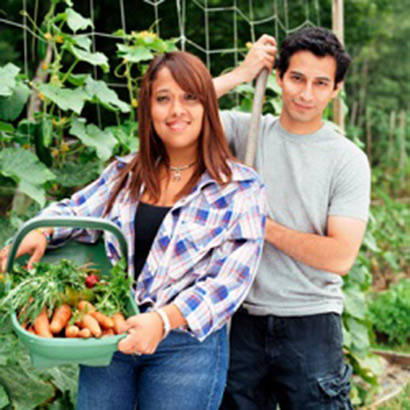
Pensacola’s community garden program is part of the city’s plan to improve the Hollice T. Williams Park as an urban greenway within Pensacola’s revitalization area. A three-acre area in the park was designated for a community garden in the recently completed park redesign plan. The park is central to several low- to moderate-income neighborhoods with ethnically diverse populations.
One of the program’s main goals is to recreate the food-growing tradition — the store of knowledge, skills, and experience — that was once common in the South and all but disappeared in the last couple of generations. By focusing on children, the program hopes to encourage families to become involved in gardening, engage in healthy eating habits at an early age, provide opportunities for exercise, and reduce childhood obesity. With limited access to food stores in the surrounding neighborhoods and the high price of fresh produce, another program goal is increasing the availability of fresh food to local residents. Teaching gardening skills and providing a nearby place to garden helps to stretch limited food dollars. The program also hopes to build community by creating an opportunity for interaction among people working together in the garden. Finally, the project is intended to add beauty to the park using a combination of organic fruit and vegetable gardens coupled with flower and butterfly gardens to assist with pollination. A proposed theme for the program is, “Eat Your Park”.
Efforts by the city, local non-profit organizations, and neighborhood associations to promote growing and selling fresh produce gained momentum following Hurricanes Katrina and Ivan. In the earliest stages of envisioning the community garden at Hollice T. Williams Park, the City Parks and Recreation Department conducted several community workshops in the surrounding neighborhoods. As Helen Gibson, City of Pensacola Chief of Neighborhoods, stated, “The idea for the community garden actually came from the residents [who] participated in that process. …They specifically were the ones [who] proposed that we do this. … I would call it a grass-roots type of response.” Ms. Gibson also mentioned that when she was addressing one of the neighborhood groups, she “asked for a show of hands — how many in the room had parents or grandparents who had a garden in the yard. And dozens of hands went up. And then I asked the same question. How many have a garden now? And very few, I don’t think any hands went up. So then I began to talk about our vision for establishing this community garden. And there was a lot of interest and people were excited about the idea, and particularly for the kids.” Children’s involvement and hard work have been a key component in creating the gardens.
With a total of 22 beds, the gardening program has had broad-based community support from both public and private sectors. About 25 children between the ages of 8 and 17, mostly teens and nearly all African-American, from three neighborhood youth groups work in six garden beds designated for youth. Adults work in the other 16 beds. Three neighborhood associations have been actively involved, one of which is buying trees and benches for the garden. Neighborhood youth, Navy cadets, and Eagle Scouts helped to prepare the site and build and transport raised beds. Seeds, seedlings, soil, lumber, compost, and tools were all purchased with funds from the NRPA grant. Escambia County Equestrian Center donated truckloads of horse manure. The county Agricultural Extension has been offering gardening workshops. One of the biggest challenges was access to water. The Community Redevelopment Agency funded the irrigation system, and the city provides the water. A landscaping class at a local junior college adopted the garden as a class project, developing several proposals for landscaping around the garden. Manna Food Bank, which has been active in promoting gardening in Pensacola, donated seeds and tools. Home Depot also donated seeds.
